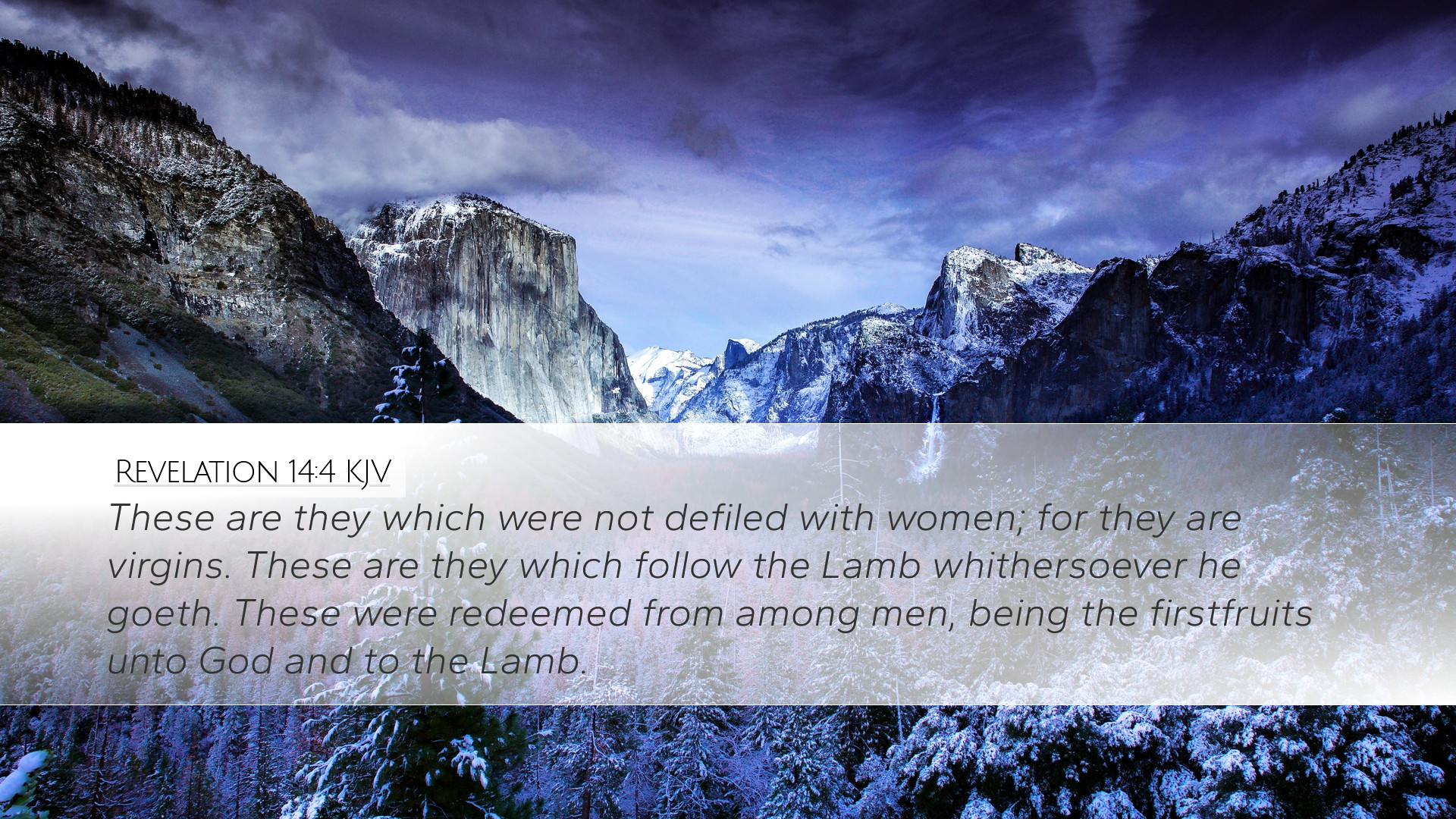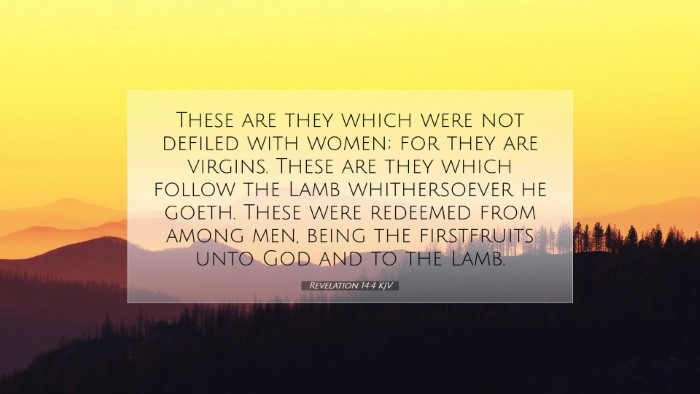Commentary on Revelation 14:4
Revelation 14:4 states, "These are they which were not defiled with women; for they are virgins. These are they which follow the Lamb whithersoever he goeth. These were redeemed from among men, being the firstfruits unto God and to the Lamb."
Introduction
This verse encapsulates a profound declaration concerning the nature and character of the martyrs and faithful ones who are described as being wholly dedicated to God. Their calling and their reward stand as examples for those who follow Christ. The insights drawn from the commentaries of Matthew Henry, Albert Barnes, and Adam Clarke provide a deeper understanding of this scripture.
Purity and Holiness
Matthew Henry emphasizes the significance of the phrase "not defiled with women." He interprets this as indicative of a particular spiritual purity, not to be understood in a literal or physical sense but rather metaphorically representing the spiritual fidelity to Christ. He suggests that those who are considered 'virgins' are those who have shunned false teachings and have remained faithful amidst tempting distractions.
Adam Clarke adds that this notion of virginity pertains to purity of heart and intention. Clarke argues that this verse is not advocating for a literal renunciation of marriage, but rather illustrates the spiritual condition of those who are devoted entirely to God. Their eschewing of 'woman' symbolizes rejection of the corrupt influences of false religion, which can seduce believers away from their devotion to Christ.
Following the Lamb
The phrase "follow the Lamb whithersoever he goeth" reflects a radical commitment to Christ.
Albert Barnes notes that true believers must pursue Christ fervently, willing to endure trials and tribulations that accompany following Him. This verse illustrates that the faithful are characterized by their readiness to go where Christ leads, representing a life of obedience and discipleship.
In the context of Revelation, the imagery of following the Lamb signifies a deep, personal relationship with Jesus—one that leads believers through challenges and into the fullness of life. This commitment is not occasional but continuous, depicting a lifestyle of trust and following.
Redemption and Firstfruits
The designation of "firstfruits unto God and to the Lamb" is rich with meaning. Henry identifies this as indicative of the special status granted to these faithful believers, signifying they are the first of God's new creation. This imagery implies a promise of greater things to come, as these individuals represent the initial fruits of redemption.
Barnes expands upon this thought by stating that the 'firstfruits' symbolize the dedication of the first yield of a harvest to God, which has implications of holiness and is an acknowledgment of God’s sovereignty over all creation. The faithful are brought forward as an exemplar of what it means to be redeemed by Christ, serving a purpose in God's grand narrative of salvation.
Implications for Believers
The characteristics of these believers serve as a call to contemporary Christians. Clarke stresses the importance of maintaining purity in a world that often defiles faith. The challenge is to remain unspoiled by worldly allures while being set apart as vessels of God's purpose.
Furthermore, following the Lamb invites believers to consider their own commitment level. Are they willing to follow Christ no matter the cost? The question resonates deeply in a society fraught with distractions and competing loyalties.
Ultimately, the view of believers as "firstfruits" encourages patience and steadfastness. Their future inheritance and standing before God is a reminder that faithfulness in adversity promises the glorious reward of eternal life with the Savior.
Conclusion
The study of Revelation 14:4 allows for an enriching exploration of themes such as purity, commitment, and redemption. As pastors, theologians, and scholars reflect on this passage, they are called to inspire others to pursue an uncompromised relationship with Christ—following Him unwaveringly and embodying the purity expected of His followers.
Through the insights of Henry, Barnes, and Clarke, this verse not only serves as an exquisite depiction of the faithful remnant seen in John's vision but also illustrates the spiritual integrity and hope that should mark every believer’s life today.


